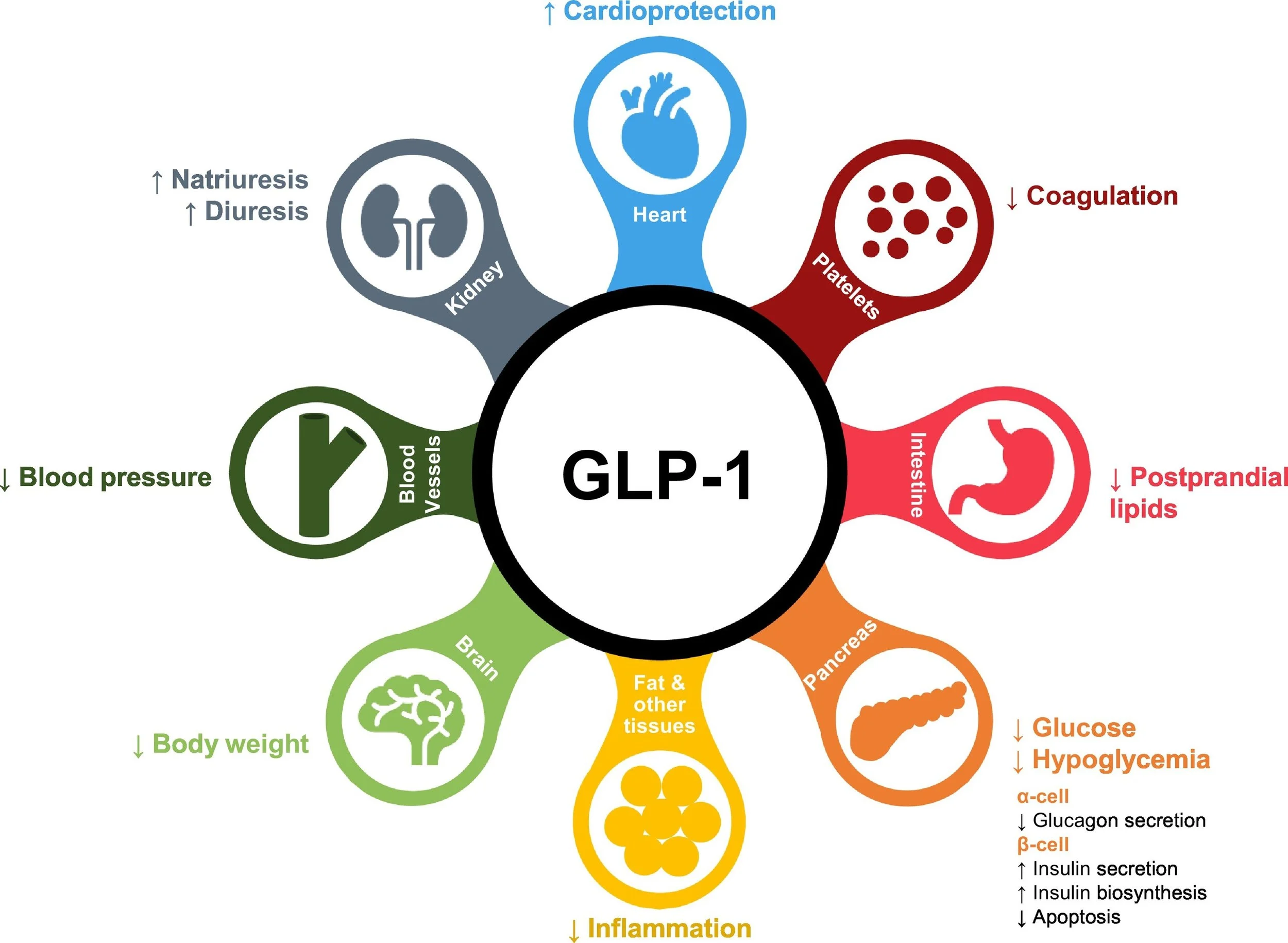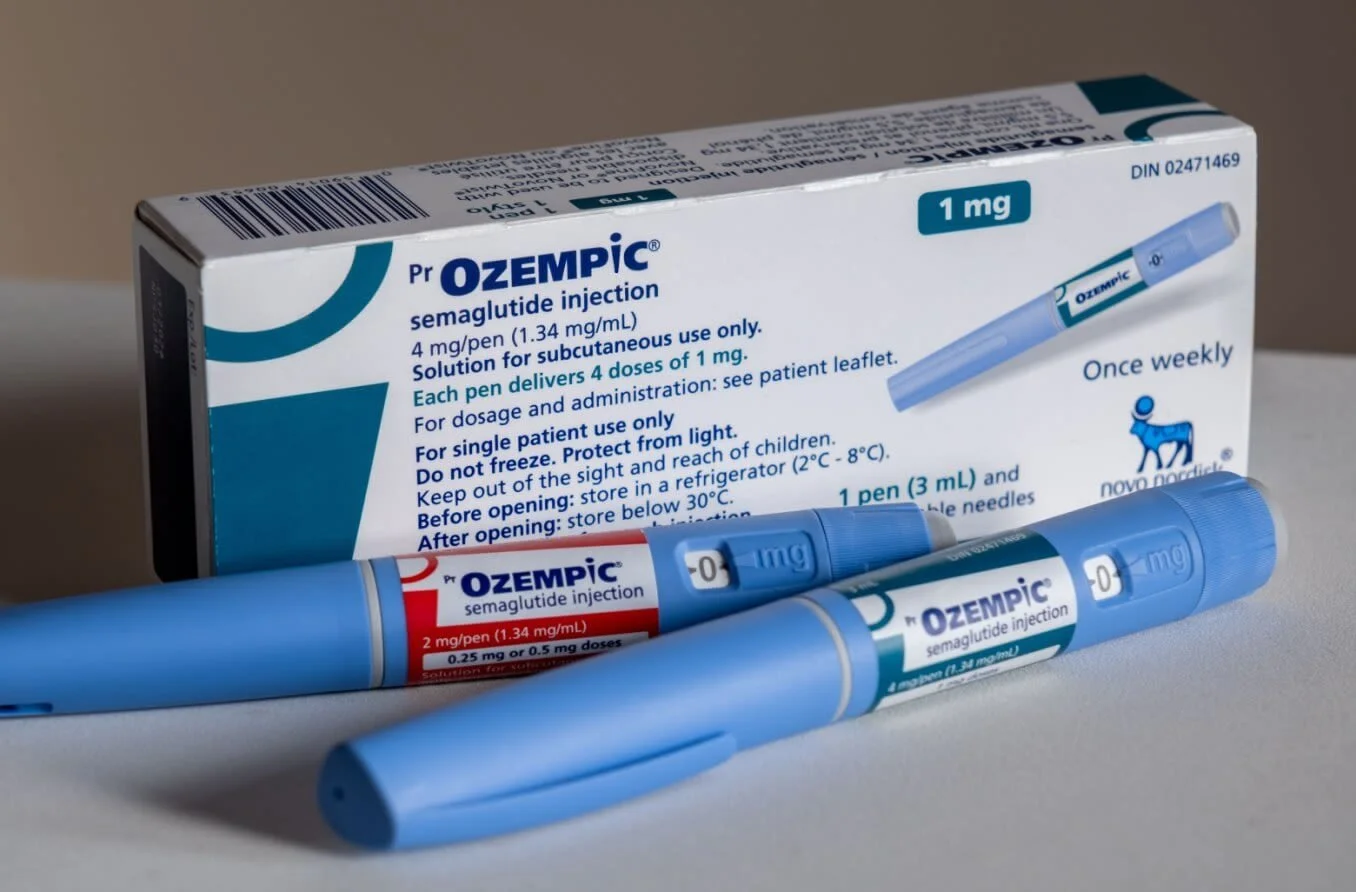Compounded-Semaglutide costs 80% less and is just as effective as Ozempic® and Wegovy®
Semaglutide patients typically lose ~15% of their body weight
Semaglutide also decreases blood pressure, blood sugar, cholesterol, inflammation, and cravings
What is Semaglutide and GLP-1
Glucagon-like peptide-1 (GLP-1) is a hormone produced in the intestines in response to meals. Semaglutide is an analog of human GLP-1 that is modified to have a longer half-life. Semaglutide has been shown to reduce blood sugar and promote weight loss through: decreasing appetite and food cravings, signaling the pancreas to secrete insulin, and slowing gastric emptying. Semaglutide injections alone do not cause weight loss. They work by decreasing appetite and interest in overeating.
FDA Semaglutide Approvals
Semaglutide (Ozempic®) was approved as a once-weekly injection to treat type 2 diabetes (2017).
Semaglutide (Wegovy®) was approved for weight loss in patients with obesity (BMI ≥30) or overweight patients (BMI ≥27) who also had a weight-related medical issue such as diabetes, hypertension, sleep apnea, high cholesterol (2021).
To determine your BMI, use the CDC Adult BMI Calculator
Common benefits of Semaglutide
Rapid weight loss: ~90% of overweight patients lose 5-20% of their body weight (average weight loss is 14.9%)
Improved blood sugar control (in patients with type 2 diabetes)
Lower blood pressure
Improved cholesterol levels
Lower risk of heart attack
Decreasing or eliminating the need for medications to lower blood pressure, blood sugar, and cholesterol
Potential benefits of Semaglutide
Decreased anxiety, depression, and OCD
Decreased interest in addictive/obsessive behaviors (alcohol, smoking, drug use, gambling, etc. )
Side Effects
Typically occur at the start or when increasing Semaglutide dosages. Many side effects can be limited by staying at lower doses longer.
The most common side effects is nausea, with about one third of patients reporting this.
Less common side effects included. diarrhea, fatigue, constipation, abdominal pain, headache, and acid reflux
Rare side effects included dizziness, depression, bloating, dry mouth, metallic taste, and heartburn
Serious side effects are very rare, but can include acute pancreatitis, cholecystitis, ileus (intestinal blockage)
Patients who should not use Semaglutide include people who are not overweight, have type-I diabetes, medullary thyroid cancer, those who have had an allergic reaciton ot other GLP-1 medications, and those already taking other GLP-1 medications.
Semaglutide Information
-

Compounded Semaglutide Is Effective
Dr. Morris provides semaglutide at ~80% off brand name prices. It is vitally important to use a FDA registered 503a/503b pharmacy and to ensure the Semaglutide is pure (not combined with sodium or acetate). A healthy lower-calorie diets and regular exercise are key to success. Follow up appointments with appropriate lab work with a physician are needed to personalize your care and to help ensure safety.
-

Semaglutide GLP-1 benefits
Semaglutide is an analog of the human GLP-1 hormone. It's been formulated to have a longer half-life which magnifies its benefits of decreasing appetite and stimulating insulin release. Patients lose an average of ~14.9% body weight, along with lowering cholesterol, blood sugar, blood pressure. Other benefits may include reduced sleep apnea, anxiety, depression, and obsessive behaviors.
-

Ozempic® & Wegovy® are Semaglutide
Typically costing $900-1,400/month, the brand name versions are blockbuster weight loss drugs. About 12% of American adults have tried a GLP-1 analog, and 6% are currently taking one (KFF Health Tracking Poll). Despite the high cost, shortages of the brand name versions have been common and frequently interrupt patient use. Compounding pharmacies are filling the demand at a fraction of the cost.

